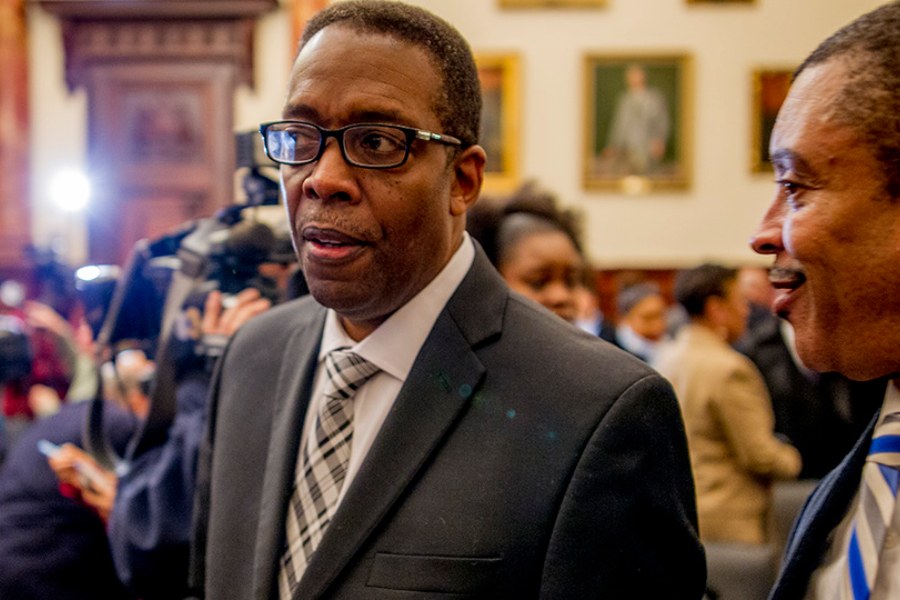Darrell Clarke, Gentrification Is Gentrification — Even If the Developer Is Black
The Council president’s office thinks that diversifying the faces behind the rapid gentrification in his district supports “minority participation in redevelopment and commercial activity.” He is long overdue for a reality check.

City Council president Darrell Clarke | Photo by Jeff Fusco
“All my skinfolk ain’t kinfolk,” the legendary Black writer Zora Neale Hurston once said.
This quote goes double for Black developers who profit from land sales that will displace their own people. One need only look to North Philadelphia for a perfect example.
In recent months, there have been reports that City Council president Darrell Clarke and members of his staff stepped in to help a Black developer acquire city-owned properties near Temple University’s main campus in 2016 after the Philadelphia Redevelopment Authority balked at the developer’s initial lowball offer. But Clarke’s office’s role wasn’t just a one-time nudge — it actually appears to have been a series of interventions that eventually led to a $125,000 discount for the developer, former NFL linebacker Shawn “Zaddy” Bullard.
City officials have yet to explain how the vacant lots on Cecil B. Moore Avenue west of Broad Street that Bullard bought were ultimately priced. While attempting to downplay the extent to which the Council president’s staff was involved in the process, a spokesperson for Clarke’s office brought up diversity as a motivating factor.
“We support minority participation in redevelopment and commercial activity in the City of Philadelphia, which to our great frustration falls far short of fully representative participation in the private sector, over which we have little to no control,” the spokesperson told the Philadelphia Inquirer. “To that end, we view this redevelopment agreement as a net positive for the City of Philadelphia.”
Seriously? A net positive? This isn’t how any of this works.
Whether developers are Black or white, helping them further gentrify your community is actually a net negative. Bullard, who was one of a handful of Black businesspeople and political figures to meet with Donald Trump in Philadelphia during the 2016 campaign, didn’t use that land to promote accessible community-led usage. Instead, he has already turned one of his lots into a coffee shop and has plans to develop his other properties into high-end luxury apartments. At one point on the project, the Redevelopment Authority told the Inquirer, Bullard failed to show that he was complying with an Economic Opportunity Plan to ensure gender and racial diversity for his construction work, though he later agreed to.
This isn’t how you “support minority participation,” Darrell Clarke. This is how you further gentrification in your district. Having a Black developer at the head of an effort that will help to push out Black and brown people doesn’t make the situation any less worse—and in many ways, it aggravates it.
Turning vacant lots in North Philly into high-end properties is just another sign of displacement for the very poor. Poverty, unemployment, and gun violence disproportionately impact Black and brown people living Clarke’s district. Given that his district contains one of the most gentrified areas in America, Clarke should be doing more to protect the residents affected by these rapid changes. Diversity in regards to those doing the development is a moot point — diversifying how the land will be used is more important.
As the backstory of this particular development becomes clearer, the Council president should think very carefully about how he characterizes it. While Clarke’s office has denied influencing the discount Bullard received, the self-proclaimed “social entrepreneur” has been saying otherwise on Instagram while boasting that he’s “box office” for the press.
Let this serve as a cautionary tale to those who think they can misappropriate diversity to escape accountability. Greed sees no race, and only one color: green. Darrell Clarke should have known better.
 —————————————————————#FAKENEWS #FightOn #Zaddy #philadelphia #phillyinquirer #IAmLegend
—————————————————————#FAKENEWS #FightOn #Zaddy #philadelphia #phillyinquirer #IAmLegend

